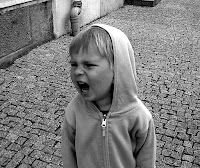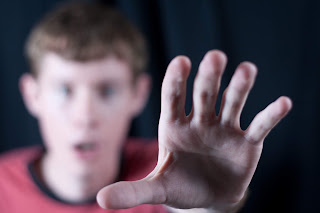‘My lad screams and freaks out whenever I have to go to work. I get up a whole extra hour early, to ease him through the process gently, but nothing I do makes it any better. I explain how important it is for me to work so we can live, and how I understand how he is feeling about it, but it doesn’t change his screaming in terror and trying to block my way to the door.’
A question like this comes up about every other day on
parenting lists.
That small children have a blatant preference for the company
of their people, and sometimes one parent or the other for a phase of life, is
as predictable as Monday morning coming after Sunday night.
While, obviously, it is ideal if kids have their needs met, and
their need for their parents are as real as their need for food and air, I also
live in the real world: the one where US healthcare costs cause more middle-class
bankruptcies than any other factor; the world where millions of very real children
are starving to death for real, every day.
The one where single parents comprise a significant portion of the workforce.
The one where single parents comprise a significant portion of the workforce.
The other day I said,
there is the ideal, the preferable, and the possible
Sometimes what parents get to choose from is in the last
category. Reality really sucks sometimes.
This means, pragmatically, sometimes the child will continue
to be wild with frustration and annoyance over a parent doing what parents get
to do: work outside the home in an environment openly antagonistic to children
(read: where kids ain’t going to be allowed to be.) We can argue for days about
what’s wrong with that, and why it’s possibly unnecessary in the very many
cases, and how children are as much a part of human life and the world as the
grown-up. . . and here we are, today, anyhow. Are we having fun yet?
Back to the miserable parent with the frantic child.
 Lots of people give lots of advice in this scenario –from ‘sneaking
out’ (aka: destroy trust early, it’s simpler than waiting) to ‘make major lifestyle
changes so you don’t have to go at all’ (underlying suggestion: please start
again at the beginning and be born with more privilege next time) to bribes,
threats, ignoring it, promises about later, using different words to explain it
better, saying ‘parents always come home’ or ‘I’ll be back later’ (and other
temptations for Fate) and all manner of other ineffective and unhelpful things.
Lots of people give lots of advice in this scenario –from ‘sneaking
out’ (aka: destroy trust early, it’s simpler than waiting) to ‘make major lifestyle
changes so you don’t have to go at all’ (underlying suggestion: please start
again at the beginning and be born with more privilege next time) to bribes,
threats, ignoring it, promises about later, using different words to explain it
better, saying ‘parents always come home’ or ‘I’ll be back later’ (and other
temptations for Fate) and all manner of other ineffective and unhelpful things.
In the History of
Explaining Things to Upset People. . .
The thing is, in the history of explaining things to upset
people, no one has ever been made less upset by any explanation. Sometimes they
may be effectively silenced (because ‘this is the reason you’re not welcome to
be upset’ can really be a powerful message) but the emotional response to the
reality they dislike remains exactly where it is, only simmering perpetually in
the background. Yay.
As a friend’s counsellor pointed out:
people give hugs and tissues to crying people because they want them to stop crying,
not because they want them to let out all their big feelings for however long it takes right now
Actually, people really need to let it out and to feel felt, as Bessel Van Der Kolk puts it,
not calmed.
The calming will come on its own, once the feelings are felt
through. The feeling through the emotions part –we don’t like that.
We Don't Like That
The calming will come on its own, once the feelings are felt through
We Don't Like That
First, because it upsets us. We feel their feelings (natural
empathy) and we dislike those powerful feelings even when they are not ours.
Second, because it feels like it is going to literally take forever. It won’t, because emotions are
a passing chemical response in the body/mind, and those chemicals deplete over
time … eventually. (The longer its been since anyone was effectively empathetic
with the feeler, the longer it will take because the backlog is bigger and
feeling felt is such a unique relief.
. . but that doesn’t have much to do
with little kids.)
Third, because people having big emotions around us feels
(often) like they’re saying it is our fault, and we often feel compelled to
justify, explain, inform or convince them why they’re wrong. Not a lot about trying
to tell an upset someone about how they are wrong is likely to improve their
mood. . .
Fourth, because it’s not fair. Few people have ever had much
experience with feeling felt
themselves, especially as kids, and we are deeply agitated by kids ‘getting
away with’ things we were banned from doing. This is very stark in people who
were shamed as children (like ‘boys do not
cry’ or ‘how dare you?!?’)
And you know what? It is not fair. Truly.
It is not fair that people ever treated children and their
emotions that way. It is less fair to mindlessly pass it on to another
generation of innocent children. Becoming aware of this impulse to seek revenge
on the next available victims is often sufficient to stop the cycle: Oh, that’s
just those nasty old voices of those old crones who were wrong then, too… I can
do something differently this time.
What Do I Do Differently?4 Easy Steps to Handling Kids’ Objections to What is Happening
Step one: empathy
Step two: repeat step one
Step three: resist the urge to explain, justify, inform or convince
Step four: empathy
Not so Easy, Is It?
The urge to rush to explain, justify, inform or convince is
powerful, because we feel like our kids’ reactions are blaming us, and there
are few things our culture is less comfortable with than blame.
This is where the adulting gets hard.
Courage, dear.
Scene: Bedroom, early morning, mother and child getting ready for the day
Mom: I AM GETTING
READY FOR WORK NOW, DEAR
Child: [SCREAMS, BITES
HIMSELF, THROWS THINGS, RAGES ABOUT WANTING TO BE WITH MOM, ETC]
Mom: You
are feeling so angry and scared that I am going to work, because you really
need me to stay home …
Child: [SCREAMS MORE, THROWS HIMSELF TO THE FLOOR,
SHOUTS AND CRIES]
Mom: [with intensity] I REALLY HEAR YOUR FURY AND
TERROR OVER MY GOING TO WORK TODAY, THOSE ARE BIG AND POWERFUL FEELINGS!! YOU
ARE FEELING SO FRANTIC FOR ME TO STAY!
Child: [CONTINUES SCREAMING AND BEHAVING ANGRY AND
FEARFUL]
Mom: I CAN REALLY FEEL HOW INTENSELY FRIGHTENED
AND ANGRY YOU ARE ABOUT ME GOING TO WORK BECAUSE YOU REALLY NEED ME TO STAY. I
AM STEPPING OUT THE DOOR NOW, HEARING YOUR FURY AND TERROR AT ME GOING.
And . . . scene.
What is happening here that is so different from the ‘usual’?
Two really big things:
1.
no one is trying to dismiss or silence the child’s
emotional reaction –quite the opposite. This is a parent saying ‘I hear you,
and I am here with you hearing you’ which builds trust, and;
2.
this is a completely neutral and blame-free
response that does not personalize the child’s emotion as the adult’s fault, or
suggest in any way that the child is to blame for either his feelings or the
adult’s emotional reaction.
Why would it?
This is the child who is, in the child’s terms, losing their
parent (for the moment, for the day, for the duration of the deployment, or,
when the child is really young and can’t understand the parent leaving and
still existing somewhere else, forever.)
So, the child starts with powerful feelings that don’t go
away by the end, how does that ‘work’? How does that qualify as ‘working’?
In mainstream terms, where the goals is to control the
child, their emotions and every aspect of their expression of emotions, it
doesn’t work.
it does not work at all for that
We Are Not Seeking That Goal
We are also not seeking the underlying goal embedded in that
control: to stop the parent feeling anything about what is happening for their
child.
One of the things mainstream advice is really resistant to is any suggestion that the parent’s actions might reasonably make the parent feel bad.
 If the child feels bad, well, that’s just to be expected, but parents should be forever free of anything like guilt, regret,
responsibility or even compassion for what their child is experiencing when
they have no power to fix it.
If the child feels bad, well, that’s just to be expected, but parents should be forever free of anything like guilt, regret,
responsibility or even compassion for what their child is experiencing when
they have no power to fix it.
That’s the thing that takes the courage: the ability to have
compassion for a child’s genuine experience when they are suffering and the
situation causing it is impossible for us to fix.
The parameters of interacting with humans (even small ones)
You can’t
control them
You can’t
control their feelings or emotions
You can’t
control how they express their feelings or emotions
You can’t
demand trust or respect
You can
control your words and actions
You can
understand your own feelings or emotions
You can
help them feel felt and heard and
understood
You can
foster trust and respect

That is what that 4 step plan reaches toward: fostering trust and respect, by helping them feel felt, heard and understood.
I did say that it takes courage because it's hard.
































